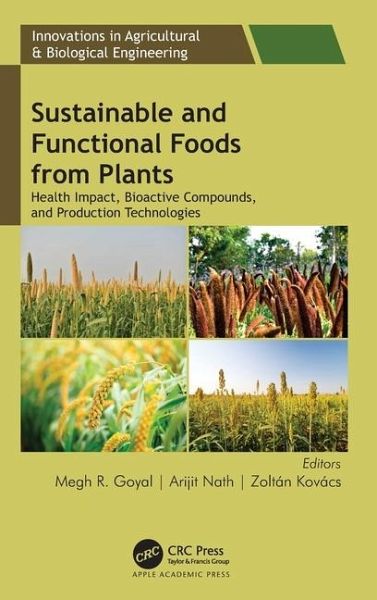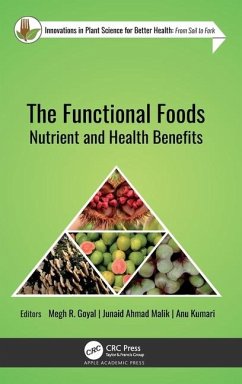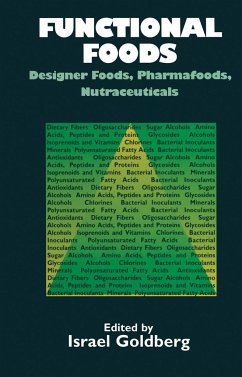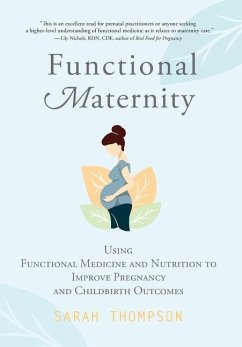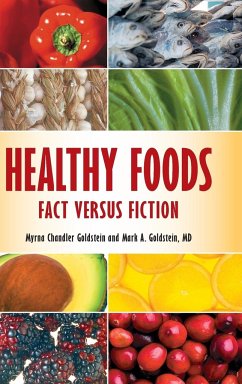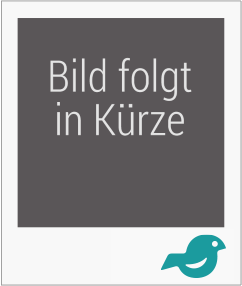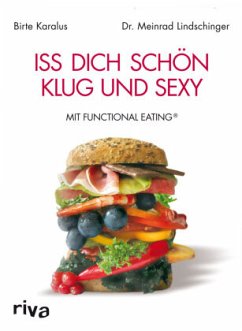Gebundenes Buch
Sustainable and Functional Foods from Plants
Health Impact, Bioactive Compounds, and Production Technologies
Herausgeber: Goyal, Megh R.; Kovács, Zoltán; Nath, Arijit
Versandkostenfrei!
Versandfertig in 1-2 Wochen
Weitere Ausgaben:

PAYBACK Punkte
107 °P sammeln!




The function of plant-based products as food is discussed along with their nutritional composition as a diet. Common adulteration practices along with quality monitoring and their potential applications are introduced. Also covers the potential of bioactive compounds in medicinal foods and measurement techniques for quality of natural foods.
Megh R. Goyal, PhD, PE, is a Retired Professor in Agricultural and Biomedical Engineering from the General Engineering Department in the College of Engineering at the University of Puerto Rico-Mayaguez Campus. He has worked as a Soil Conservation Inspector and as a Research Assistant at Haryana Agricultural University and Ohio State University. He was the first agricultural engineer to receive the professional license in Agricultural Engineering from the College of Engineers and Surveyors of Puerto Rico and was proclaimed as the "Father of Irrigation Engineering in Puerto Rico for the twentieth century" by the ASABE, Puerto Rico Section, for his pioneering work on micro irrigation, evapotranspiration, agroclimatology, and soil and water engineering. During his professional career of over 52 years, he has received many prestigious awards. A prolific author and editor, he has written more than 200 journal articles and several textbooks and has edited over 100 books. Arijit Nath, PhD, is a Postdoctoral Researcher and Teaching Assistant in the Department of Food Process Engineering, Institute of Food Science and Technology, Hungarian University of Agriculture and Life Sciences, Budapest, Hungary. Dr. Nath has held a variety of positions, including postdoctoral research fellow in the Department of Food Engineering at Corvinus University of Budapest, Hungary; Department of Biochemical and Chemical Engineering at Technical University of Dortmund, Germany; Department of Refrigeration and Livestock Products Technology at Szent István University, Hungary; and chemical engineer in Soós Erno Research and Development at University of Pannonia, Hungary. He has participated in several professional industrial training and workshops in the field of biotechnology. He has published 30 research and review articles in international journals and 12 book chapters. Dr. Nath has also presented the research outcomes in more than 70 international conferences and 15 conferences within India. He received several best presenter awards at international conferences. He has also delivered lectures in several scientific communities with honor. Due to his strong proficiency in the field of biochemical and food engineering, he is serving as a reviewer and an editor in SCI journals and books. Dr. Nath is a member of the Asia-Pacific Chemical, Biological & Environmental Engineering Society; Indian Institute of Engineers; Indian Institute of Chemical Engineers; Biotech Research Society of India; European Membrane Society; Indian Membrane Society; and European Federation of Biotechnology. Dr. Nath teaches several theory subjects and is co-supervisor for undergraduate, postgraduate, and PhD students in the Department of Food Process Engineering, Hungarian University of Agriculture and Life Sciences, Hungary. His major research focus is on fermentation technology, enzymatic reaction, bioreactor design, probiotics and prebiotics, allergy-free food products, food waste valorization, membrane separation process, membrane integrated bioreactors, environmental benign processes, and mathematical modeling of bioprocesses. Dr. Nath received his PhD award in Chemical Engineering from Jadavpur University, India, in 2014. During his PhD tenure, Dr. Nath was a senior research fellow, supported by the Council of Scientific and Industrial Research (CSIR), Indiam and project research fellow, supported by the University Grants Commission (UGC), India. Zoltán Kovács, PhD, is a Professor in the Department of Measurements and Process Control, Institute of Food Science and Technology, Hungarian University of Agriculture and Life Sciences (MATE), Budapest, Hungary. He is also the International Affairs Advisor for the Institute. He received his MSc and PhD diplomas in Food Science at Corvinus University and completed his habilitation in the field of food science at Szent Istvan University, Hungary. He spent three years as a postdoctoral research fellow at Kobe University, Japan. Since his postdoc period, he has been also working with the near infrared spectroscopy (NIRS), using both the conventional and the novel aquaphotomics data evaluation techniques. Dr. Kovacs has won several research awards and fellowships, including pre- and postdoctoral awards and National Excellence Fellowships. Recently he won the János Bolyai Research Scholarship of the Hungarian Academy of Sciences. He won the József Farkas Excellence Award of the Faculty of Food Science, Szent Istvan University, and the research group under his leadership won three Excellence Research Group grants for their research to develop measurement methods for quick determination of adulteration in various food products. Currently, Dr. Kovacs collaborates and leads different national and international research projects. He is the International Affairs Advisor of the Institute of Food Science and Technology, MATE. To date, Dr. Kovacs has published 70 impact factor articles, six book chapters in international journals and books and has contributed to over 100 international and Hungarian scientific conference presentations, for which he won best presentation awards. Dr. Kovacs is a member of Agro- and Biosystems Engineering Research Committee of the Hungarian Academy of Science and acts as the European Liaison of the International Aquaphotomics.
Produktdetails
- Verlag: Apple Academic Press
- Seitenzahl: 460
- Erscheinungstermin: 28. Juni 2024
- Englisch
- Abmessung: 240mm x 161mm x 29mm
- Gewicht: 851g
- ISBN-13: 9781774914540
- ISBN-10: 1774914549
- Artikelnr.: 70159042
Herstellerkennzeichnung
Libri GmbH
Europaallee 1
36244 Bad Hersfeld
gpsr@libri.de
Für dieses Produkt wurde noch keine Bewertung abgegeben. Wir würden uns sehr freuen, wenn du die erste Bewertung schreibst!
Eine Bewertung schreiben
Eine Bewertung schreiben
Andere Kunden interessierten sich für




